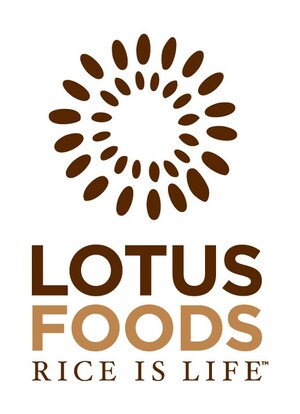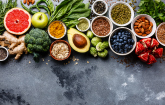Lotus Foods Specialty Rice to Promote Climate- and Women-Smart Rice Production
RICHMOND, Calif., Jan. 19, 2017 /PRNewswire/ -- Jasmine Rice and Basmati Rice are the most recognized and best-selling rice imported into the US, made popular by their intense fragrance and prevalence in Thai and Indian-inspired cooking. Lotus Foods, which specializes in prized rice varietals that are grown more sustainably on small family farms, is introducing their specialty Jasmine and Basmati Rice in new 30 oz. packaging. "Consumers will have more volume at a reduced price per ounce," says Lotus Foods Co-Founder/Co-CEO Caryl Levine. "But more importantly, it is the first-ever offering in the US of Dehraduni, the 'Mother of All Basmati Rice' – a true heritage varietal. And our Jasmine Rice is Phka Malis from Cambodia, awarded 'World's Best Rice' for three consecutive years!"
Both the Dehraduni Basmati and Jasmine Rice are certified organic and fair trade, and will be available as whole grain brown and milled white rice. Dehraduni's superior flavor, fragrance, texture and elongation are what helped elevate basmati rice to its worldwide popularity. But to satisfy demand and eke out higher yields, many basmati farmers in India and Pakistan have switched to hybrids, which are bred for yield rather than quality. This is what is commonly available to American consumers. Dehraduni Basmati is a landrace from Uttarakhand, India. This means it has evolved locally and lacks any formal crop improvement. With More Crop Per Drop™ practices local farmers are able to increase yields without the need for expensive hybrids and agrochemicals. "This is a win-win for all," Levine states. "Organic and fair trade premiums will improve farmers' incomes and provide strong incentives to keep this beloved rice in production, and consumers can enjoy these special grains."
Both the Jasmine Rice and Basmati Rice are grown using More Crop Per Drop™ practices, which save water and seed, and reduce women's work and methane emissions. "As rice importers, we have a responsibility to create incentives for producers who are saving water and adopting climate-smart methods, and we need to educate consumers about these issues," insists Ken Lee, also Co-Founder and Co-CEO. "The reality is that we urgently need to change how rice is grown." In its recent report, Feeding Climate Change, Oxfam urges that the System of Rice Intensification (SRI), which Lotus Foods refers to as More Crop Per Drop™, be adopted as a solution [see Box 1 in report].
Since 1995, Lotus Foods has been partnering in fair trade with small family farmers around the world who are growing rice more sustainably and preserving heirloom and specialty rices. Lotus Foods' product line is unique in delivering consumers healthier, versatile rice and rice-based foods that respect their multiple concerns for the highest of standards of taste together with social and environmental ethics.
SOURCE Lotus Foods
WANT YOUR COMPANY'S NEWS FEATURED ON PRNEWSWIRE.COM?
Newsrooms &
Influencers
Digital Media
Outlets
Journalists
Opted In






Share this article